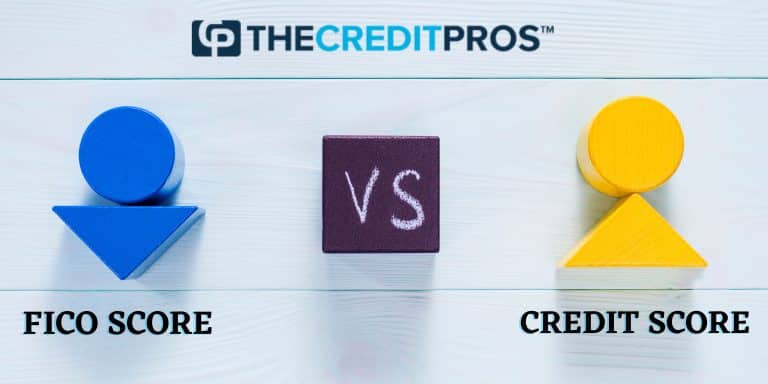Simple Yet Best Guide To FICO Score Vs. Credit Score In 2023
Table of Contents
Navigating the Credit Maze: Your Best Guide to FICO Score vs. Credit Score
If you are wondering which is better, “FICO score vs. Credit score,” you should first know that they are not different from each other. A credit score represents with a three-digit number how well you are managing your finances. A FICO score is one of the many types of credit scoring methods lenders may use to determine the risk of a borrower.
Understanding the FICO score vs. credit score differences can help you improve your credit score, which in turn helps you get approved for loans at lower rates. Whatever your scoring method is, FICO score vs. credit score, keep checking your credit scores regularly, so you can keep track of how your credit score is trending.
Related Reads
- Why Maintain a High FICO Score?
- What Is a FICO score?
- Revealed! Why Your Credit Scores Suck: FICO Reason Codes
What Is a FICO Score?
FICO scores are one kind of credit score. The name is derived from the Fair Isaac Corporation, which introduced the credit scoring model, FICO score, in 1989. The terms “credit score” and “FICO scores,” are most common, but there are other scores from other brands as well.
FICO scores range from 300 to 850, and a higher credit score indicates that you are maintaining a healthy financial life. There are industry-specific scores offered for credit cards and car loans, which can range from 250 to 900.
What Is a Credit Score?
A credit score uses a three-digit number to represent your financial health. Lenders use this score to see if you are a responsible borrower before approving you for any financial loans. Usually, higher credit scores indicate that you borrow and pay back your due on time. On the other hand, a lower credit score makes them assume that you are struggling to manage debt obligations.
Credit scores are generated by credit score providers, like Equifax, Experian, and TransUnion, with the information included in your credit reports. Your credit report has a collection of information about your financial status, including:
- Your identity
- Credit accounts that already exist
- Your public records, liens, judgments if any, or any bankruptcy filings.
- A copy of your credit file, along with inquiries from organizations or individuals.
The companies that generate credit scores are mostly the ones that maintain them. Credit reports are compiled based on the information available from public records, as well as information from creditors’ reports.
FICO Score vs. Credit Score
FICO scores are one type of credit score, and so are Vantage scores. FICO scores have multiple versions, but the most widely used score is the FICO score 8, which was introduced in the year 2009. FICO 9, as well as FICO 10 and FICO 10T are the latest versions with some updates made to the previous FICO scores versions.
In terms of a FICO score vs. a credit score, FICO scores are the ones commonly used, and more specifically, mortgage lenders use much older versions of the FICO score, but FICO scores 10 and 10T will start to be used in the next few years.
If you are new to credit or looking to rebuild your credit, a newer type of FICO ‘UltraFICO’ has been introduced. It has the same FICO score scale of 300 to 850, but it calculates a score using activities in the deposit account.
FICO Score vs. VantageScore
VantageScore was jointly developed and introduced by three major credit bureaus in 2006. When it comes to FICO score vs. credit score, the FICO score is well-known among customers and used widely by lenders. However, in recent days, VantageScore is gaining traction among both customers and lenders.
According to FICO, 90% of lending decisions are made using FICO, and the law favors FICO in home mortgages, which is a crucial spot. The only tool approved right now by enterprises, like Fannie Mae and Freddie Mac, that are sponsored by governments for lenders to evaluate credit risk is FICO.
However, the FICO 10T and VantageScore 4.0 are required to be used by Federal Housing Finance Agency for the loans sold to Fannie and Freddie. It takes a “multilayer effort” for the implementation and coordination of these two scoring models, and the benefits of both are significant, especially for minority home buyers.
How Accurate Is the FICO Score?
In FICO score vs. credit score, FICO score is a type of credit score that depends on the accuracy of the factors that makes up the FICO score model that is being used, whether the report is taken from a credit bureau, and whether you have up-to-date information on your credit reports.
The accuracy of your FICO score could be affected if there are errors on your credit report. FICO scores range from 300 to 850, and what the FICO score means depends on what scores you have. The following credit range is based on the FICO score 8 credit score.
- Exceptional: 800+
- Very good: 740 to 799
- Good: 670 to 739
- Fair: 580 to 669
- Poor: 579 and below
The industry-specific scoring models in FICO scores, like FICO Auto Score 8, and FICO Bankcard Score 8 have a broader range of 250 to 900. These credit scores are made for specific types of credit.
How Is FICO Score Calculated?

FICO score vs. credit score
The scoring formula of FICO credit scores has not been revealed, but it has given some important guidelines about the factors that influence the scores.
- Payment history – 35%: Making payments on time can be helpful to your score, while late or missed payments can directly affect your credit score, especially if you don’t have a long credit history.
- Credit Utilization – 30%: The usage measure of how much of your available credit you have used. The less you utilize your available credit the more your credit score increase.
- Credit Age – 15%: Credit age is measured by the average length of time for which someone has been using credit, usually known as credit history. The longer the credit history is, the lower the chance of your score getting affected.
- Credit Mix – 10%: The types of credits you have used are all considered in FICO. Your credit score increases if you use all types of credit, like loans or credit cards, and other financial lines of credit.
- Credit Inquiries – 10%: A hard credit check is registered when a new credit inquiry is registered on your credit reports. This is when credit card issuers or lenders want to inquire about your credit report before approving any credit.
Frequently Asked Questions
- FICO score vs. credit score – Is A FICO score the same as a credit score?
Basically, when it comes to FICO scores vs. Credit scores, they all refer to the same thing. FICO scores are a type of credit scoring model. Different reporting agencies use different factors to weigh your credit score, which differs slightly, but the same thing is measured and reflected essentially on your credit report.
- Which is better: The FICO score vs. credit score?
Consumers have been a little confused for years about which credit score matters the most. Although they are almost the same thing. FICO scores matter the most even though there are many types of credit scores. When it is a FICO score vs. a credit score, lenders use the FICO credit scores most commonly to decide the risk factors in approving a loan for a customer, and at which rate the interest should be charged.
- Why is my FICO score different from my credit score?
The credit bureaus get reported to the lenders about your credit information at different times, which results in one agency having more up-to-date credit information than another. The same information can be stored, displayed, and recorded by credit bureaus in different ways.
FICO Score vs. Credit Score – Key Takeaways
So the question, “Which is better? A FICO score vs. credit score,” is not valid, since we know that one of the credit scoring models is the FICO score, and there are again different versions of FICO scores, including the FICO score version 8, which is the most commonly used.
FICO score vs. Credit score, it doesn’t matter what scores you are looking at, most of them can give you an idea of what state your credit is in. But, make efforts to stay on top of your credit scores, so you can determine where you are standing, and take steps to improve your credit health.
If you need help improving your credit health, or have any other queries related to credit repairs, reach out to The Credit Pros immediately for quick and effective solutions.



